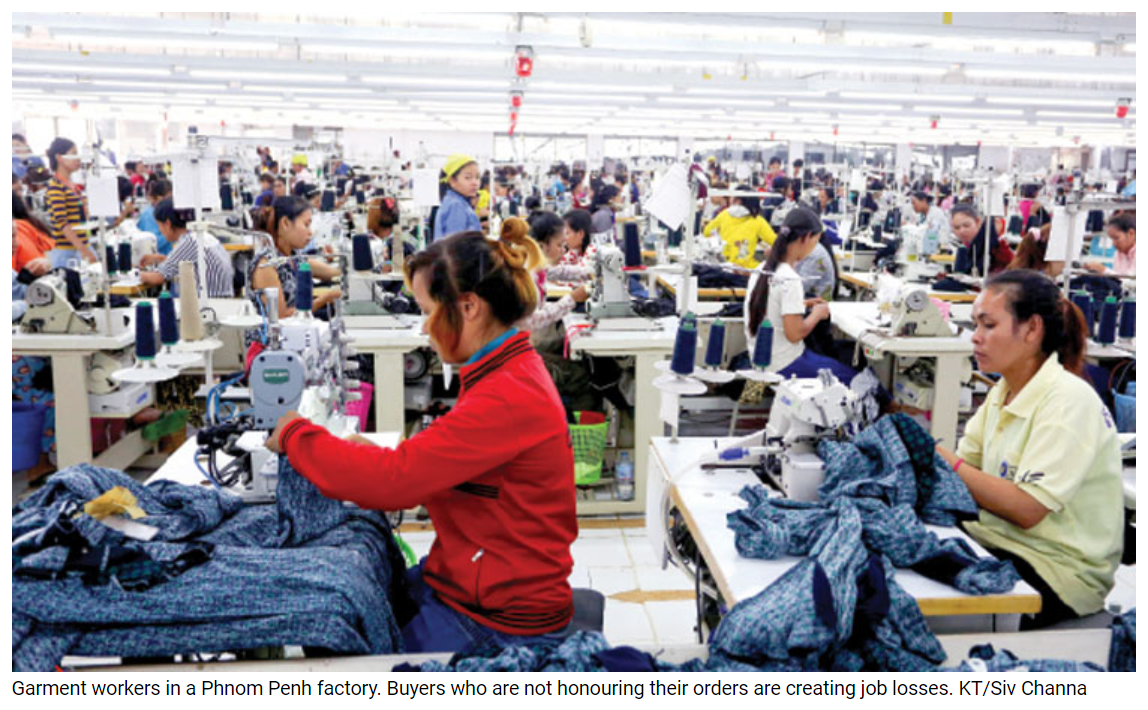Cambodia: Garment buyers urged to fulfil purchase contracts in bid to save 750,000 jobs
The Cambodia Manufacturers Association (GMAC) has reiterated an appeal to all buyers who source their goods from its members to work with the body to overcome the critical situation caused by the global COVID-19 outbreak, in an open letter issued late last week.
The letter urged all buyers to fulfill their purchase contracts by taking delivery and paying for goods already produced and currently in production as is their obligation.
“This will save 750,000 jobs (globally) and enable factories to pay their workers and ensure the livelihoods of millions of Cambodians,” GMAC said.
The letter also stated that the global pandemic has brought chaos to every corner of people’s lives and businesses, with all parties in the global apparel supply chain suffering.
“Our manufacturers operate on razor-thin margins and have less ability to shoulder this burden compared to our purchasers, who still need to put food on the table,” GMAC added.
The government has announced a host of measures to alleviate the plight of garment workers whose wages have been affected because of production suspensions.
In the plan, garment workers whose factories have closed will receive 60 percent of the minimum wage. Two-thirds of that is the responsibility of the factory owners, with the remaining 20 percent being provided by the government.
While China’s supply chains have reportedly resumed, ensuring the flow of 60 percent of the raw materials used in Cambodia’s textile industry, clothing manufacturers are still facing even greater problems because of the declining supply orders from distributors and retailers in Europe and the United States, the main market destinations for the Kingdom’s garment industry.
“Scores of clothing brands and retailers have cancelled orders without assuming financial responsibility even when workers had finished making their products,” Human Rights Watch (HRW) claimed in a statement last week.
“Many supplier factories in Asia are strapped for cash and unable to pay workers’ wages and other compensation because of the brands’ actions,” the statement continued, adding that the COVID-19 pandemic has caused both the sales of clothing brands and retailers to plummet.
According to the HRW, many have closed their retail stores to check the spread of the virus. While navigating this crisis, some brands and retailers have taken advantage of unfair purchasing practices.
“Brands should take steps to minimise the devastating economic consequences for garment workers in their global supply chains and for their families who depend on this income to survive,” said Aruna Kashyap, senior counsel in the women’s rights division of HRW.
Thus far, HRW said the H&M Group, Inditex (Zara and other brands), and Target USA have taken steps in the right direction, which these and likely other companies have committed to take delivery of goods already produced or in production and pay for them as previously agreed upon.
“More brands should take similar steps to ensure fair treatment of workers, including payment of wages and other compensation, and minimise job loss,” HRW said.
As of yesterday, around 90 of Cambodia’s garment factories had suspended their operations, resulting in 60,000 job losses, according to the Ministry of Labour and Vocational Training.
Bangladeshi factories have reportedly lost an estimated $138 million so far due to cancelled or suspended orders from international brands, while an estimated one million workers have already been laid off or temporarily suspended.
In Myanmar, 20,000 workers have already lost their jobs and one industry expert estimated that as many as 70,000 garment workers could lose jobs within a week.
Source: https://www.khmertimeskh.com/50709856/garment-buyers-urged-to-fulfil-purchase-contracts-in-bid-to-save-750000-jobs/


 English
English




